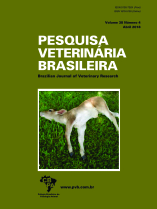 |
|
|
|
Year 2018 - Volume 38, Number 4
|

|
Epidemiological characterization of leptospirosis in pig herds reared under poor technical condition in the Brazilian semiarid, 38(4):613-619
|
ABSTRACT.- Leite A.I., Coelho W.A.C., Brito R.L.L., Silva G.C.P., Santos R.F., Mathias L.A. & Dutra I.S. 2018. [Epidemiological characterization of leptospirosis in pig herds reared under poor technical condition in the Brazilian semiarid.] Caracterização epidemiológica da leptospirose suína em criações não tecnificadas do semiárido brasileiro. Pesquisa Veterinária Brasileira 38(4):613-619. Departamento de Ciências Animais, Universidade Federal Rural do Semi-Árido, Av. Francisco Mota 572, Costa e Silva, Mossoró, RN 59625-900, Brazil. E-mail: alex@ufersa.edu.br.
This study was conducted in pigs of Mossoró, Rio Grande do Norte, with the objective of epidemiological characterization of swine leptospirosis in herds reared under poor technical and sanitary conditions in the Brazilian semiarid. Serological diagnosis of infection was carried out by means of microscopic agglutination test (MAT), and the samples were submitted to a collection of 24 Leptospira serovars. Information about, variables referring to the farm owner, general property characteristics, productive, reproductive and health management were obtained, by means of visits to the farms and interviews, in order to perform an analysis of risk factors. A prevalence of 78.6% (324/412) of seropositive pigs was observed. The samples were positive to 15 serovars, with predominance of serovar Icterohaemorrhagiae, followed by Pomona, Shermani and Tarassovi. The animals were positive for up to eight serovars. The titles ranged from 100 to 12,800, and the highest titers were observed to serovar Pomona. In all the 20 examined herds there were reactor animals, and the prevalence in each herd ranged from 25% to 100%. The risk factors that were associated with leptospirosis were the confinement system of animals and bad sanitation of breeding facilities. The use of treated water for watering the animals showed a protective factor. The results showed that Leptospira spp. was found to be quite widespread in swine farms of Mossoró, with wide variation of circulating serovars, representing a problem in animal production and risks to public health.
|
| |
|
|
| |
|
 |